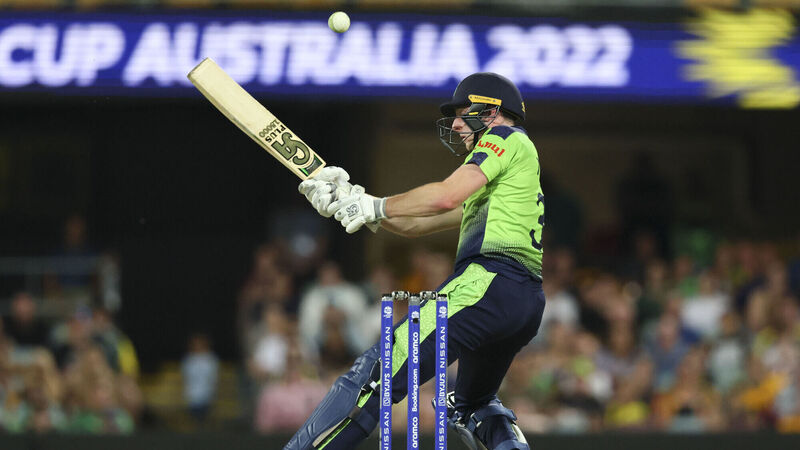Ian Mallon: After World Cup glory, is Cricket Ireland facing darkest hour?

INTO THE DARKNESS: Ireland's Lorcan Tucker bats during the T20 World Cup cricket match between Australia and Ireland, in Brisbane. (AP Photo/Tertius Pickard)
TOMORROW, the Irish Cricket Team will bring to a close one of the great Irish sporting journeys – and will immediately turn down a road of growing uncertainty.
As the team winds up its final group game at the ICC T20 World Cup in Adelaide v New Zealand, Cricket Ireland will continue the pre-planning phase as one of the co-hosts of the competition in 2030.
Ireland, along with England and Scotland, won the rights to host the tournament, opening up the country to a potential global audience of 2 billion. But with one snag – it must have ‘ground broken’ on a new stadium by 2023.
The NGB has even identified the land it needs on the National Sports Campus.
The problem is that it must line up behind badminton and cycling for facilities which have to be completed once government approval is granted.
Sport Ireland has told The Pitch that the development of a cricket stadium is included “in the Master Plan (for the campus)” which is a 15-year “detailed phasing and programming” process – time that cricket doesn’t have.
The urgency to begin construction of a stadium a full seven years before the World Cup is down to the nuances and complexities of developing a crease and pitch, which require a three-year bedding-in period.
This would require groundwork on the pitch to be in place by 2026, and within a completed stadium infrastructure plan.
With no architectural plans drawn up – let alone the approval of the site, less planning – there is a growing fear that Cricket Ireland will not meet the 14-month grace period imposed by the International Cricket Council.
Cricket Ireland’s CEO Warren Deutrom told The Pitch that he cannot contemplate having to hand the tournament back to the ICC, in a move which would be devastating to the progress of a team which has just beaten England on the world stage.
“It’s the world’s second biggest sport, we are the tenth best at it - no other sport (except football) can touch cricket with regards to (global) television audience,” he explains.
“We just need a stadium and it continues to be incredibly frustrating that we do not have the infrastructure that is commensurate with our status.”
Currently Ireland plays home internationals at Malahide, where a suite of temporary facilities and structures are constructed at a cost of up to €1.5m – such short-term facilities won’t wash with the ICC for a World Cup.
“It is becoming a reputational issue for us when we’re asking the world’s best teams to change in temporary marquees, let alone the staggering costs we incur each time we need to fulfil a home fixture – costs that no other sport have to face.”
In 2018 when Ireland hosted its historic first test match against India at Malahide - 200 million people watched the game in India, impressing even a watching Taoiseach and cricketing enthusiast.
“Leo Varadkar was one of the first politicians to commit to attending matches – home and abroad – when he was Minister for Sport,” reminds Deutrom.
“He even remarked about the success of the victory over England in the 2011 World Cup as hugely significant for Ireland as a nation on the international stage.
“In the match programme for our series against India in 2018, the Government also promised that building a stadium for cricket at the National Sports Campus would be a priority for them.
“Four years later we still have nothing.”
A cricket stadium would cost upwards of €20m – although costs have not even been determined given the absence of land approval, which only then can benchmark architectural, planning and construction costs.
Currently Cricket Ireland has an approximate turnover of €12m - it receives less than one per cent of overall sports funding - and is dependent on third-party support through businessman Denis O’Brien and the ICC.
While there would certainly be a significant public purse requirement for a cricket stadium, Deutrom fears that the issue may come down to political priorities.
“We have knocked it out of the park and we have proved our case time and time again at World Cups for the last 15 years, so I believe it is no longer tenable for the Government not to make this a priority,” he continues.
While politics and government always see greater political value in the ‘Big Three’ sports, Deutrom is hoping that the current Minister for Sport’s enthusiasm to increase applications to host global sporting events may sway talks when the two meet in the coming weeks.
However something remarkable will have to happen when Jack Chambers sits down with Cricket Ireland.
“ICC have told us that ground needs to be broken next year if the stadium is going to be erected in time to be at a satisfactory standard for a 2030 World Cup.
“We simply have to have a stadium – and we’re running out of time based on the timelines ICC have given us.”
“The Minister will shortly be bringing the Masterplan to Government for approval,” the Department of Sport told The Pitch, but warned that “a business case for the provision of long term (cricket facilities) will be subject to the requirements of the Public Spending Code and the availability of funding”.
A NEW betting operator which claims it will pay back losing bettors up to 40% of losses is planning to launch in Ireland in time for the FIFA World Cup.
‘We The Bookie’ has been granted a remote Bookmakers Licence by Revenue, and is due to begin trading on November 20.
It has committed to delivering 50% of its gross turnover into a pool which is then used to compensate bad bettors, or losing punters.
The Canadian-backed operation, with a Tralee-based CEO – former actuarial consultant with Mercer, Malcolm Wilkinson - has set an ambitious target of landing 10,000 customers in its first year of operation, whom it assumes will stake €15m on bets – or €125 per month.
It believes that due to the compensation pool and winning stakes, customers will spend an average of €9 each after losses – with €4.50 being retained by the company after cash is added to the compensation pool.
The Pitch has spoken to three well-placed industry sources who are sceptical about the model and believe that the numbers cannot stack up enough to deliver profitability in an area where the margins are so small – horseracing offers a 7% return for bookies, on average.
‘We The Bookie’ insists that its long-term strategy model will result in significant numbers of players increasing year on year with 32k by year 2 and 84k by year 3.
Losing gamblers, it says, will see their losses compensated by between 10-40 per cent at the end of every month, claiming that such a system presents a socially responsible model, particularly in times of gambling regulation.
The compensation system is modelled on what the operator calls a ‘WeShare Pool’ which it says “is divided proportionally among the customers who have experienced net losses that month.
BASKETBALL Ireland has agreed a long-term deal with a provider for a Live Scores, Fixtures and Players data service which has already rolled out across its key leagues.
NBN23 has begun providing service for the InsureMyVan.ie and MissQuote.ie Super League and Division 1 leagues, and is part of the ongoing digitalisation of the sport, under the watch of CEO John Feehan.
Feehan said the rollout will eventually see all levels of basketball being covered by the live service, which he says “will make basketball easier to follow for media, fans, clubs, coaches, players and more”.
The service is available on the federation’s ‘Swish All Hoops’ app, available through the usual providers.








